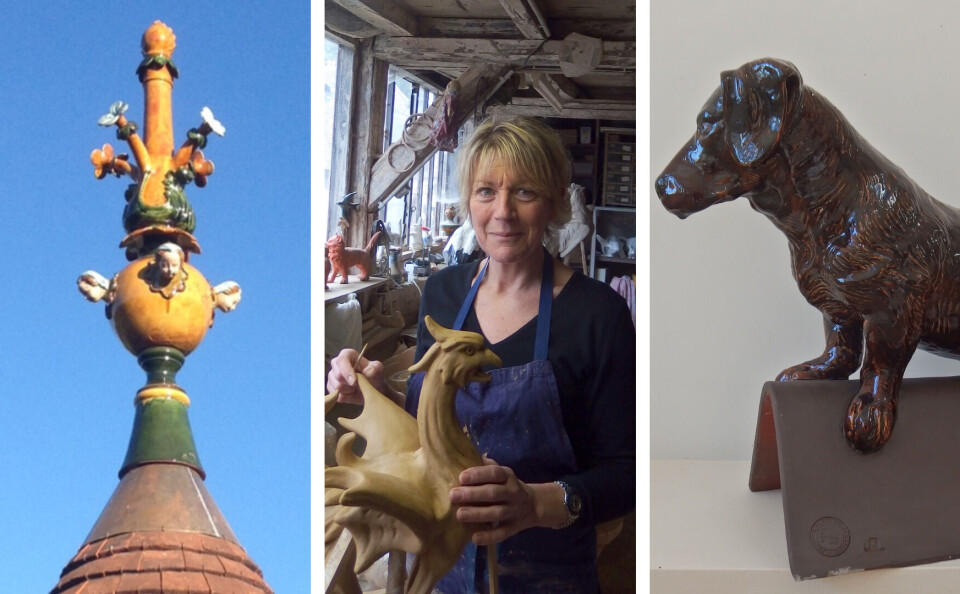-
Breton name bowls: 'People are no longer interested in the traditional craft'
These bowls have become a staple of French cabinets and breakfast tables, but how are they really made?
-
'I helped restore French cathedrals as a female American stone cutter - despite prejudice'
Stella Cheng, who worked on the restoration of Notre-Dame Cathedral, faced sexism and racism
-
French woman named one of world’s best teachers
Céline Haller, inspired by English and US teaching methods, has gained recognition for revolutionising learning with hands-on projects and inclusivity
How France’s taste in roof décor has shifted from religion to pets
A long-established Normandy pottery says it is receiving requests to put labradors, cats and even toucans on its ceramic finials

Dominique Kay Mouat started life in Guernsey and spent her childhood in and out of her mother’s pottery studio.
When her mother bought the Poterie du Mesnil de Bavent, an historic workshop near Caen (Calvados), Dominique joined her five years later, in 1992.
“She needed someone with IT knowledge,” Dominique said, in an effort to modernise the company and take advantage of online opportunities.
The pottery was founded in 1842 and specialises in épis de faîtage (finials) – decorative roof ornaments typically based on a ridge tile to emphasise the gable end or apex of the roof.
She had studied fine arts in the UK and worked in Paris, so it did not take long for Dominique’s role to extend to the ceramics side of the business and keeping up the long tradition of Mesnil de Bavent.
She has been there for 30 years now, and uses many of the same methods as when the pottery first opened.
Animal imagery
Epis de faîtage have traditionally depicted birds and animals – in a religious capacity, as representative of the Holy Spirit, for example.
However, as Christianity’s influence has waned, other animals have been introduced, two of the most popular of which are cats and swallows.
One American couple even asked for finials depicting their pets – a golden retriever, labrador and a black-and-white cat.
Another client who travelled extensively wanted a toucan.
Functional to fancy
Epis de faîtage were first used to prevent rain damaging the framework but grew massively popular in the 19th century as decorative pieces.
They are not, contrary to popular French belief, an indication of the property owner’s wealth.
Many people equate bigger épis de faîtage with bigger means, but their size is generally supposed to be scaled to a tenth of the property size, explained Dominique.
The clay is not local but rather comes from Limoges (Haute-Vienne), where it is proven to be better at resisting cold temperatures.
It is moulded as per the chosen design and fired at 1,140C for 30 hours before being left to rest for a couple of days.
After this, glazes are applied to colour, decorate and waterproof the finials, and then they are fired for a second, third and sometimes a fourth time.
“Every new épi is a challenge but there is real excitement that comes from the creative process,” Dominique said.
Each one takes an average three months to create.
Mesnil de Bavent counts mairies, architects and private individuals among its customers, and has delivered as far as Japan, the United States and Mexico in the past.
Training
While Dominique studied in the UK, French people looking to follow her into the craft will need to enrol at specialist ceramics schools, such as Cnifop, Ecole d’art céramique in Vallauris (Alpes-Maritimes) or the Ecole arts et techniques céramiques in Paris.
Students will start with a CAP vocational course for two to three years, but could extend this and graduate with a BMA or BTS up to the Diplôme National Supérieur d’Expression Plastique (DNSEP), the highest level in ceramic studies.
Crafting in France for 30 years has brought Dominique its fair share of ups and downs.
Her English accent has virtually disappeared in that time, but she says there are still frequent misunderstandings when working alongside her French colleagues – largely due to the very different sense of humour between the two nations.
A family affair
She lives in France with her Irish husband, Jeremy Flynn, whom she met in the UK via their mutual love for sailing.
Jeremy gave up both his career and his home to be with her at Mesnil de Bavent and help raise their two children.
He, too, now works as a ceramicist at the workshop.
In 2007, Dominique and her colleagues helped secure Entreprise du Patrimoine Vivant status for the pottery, which is conferred by the Ministry of Economics and Finance to French companies demonstrating excellence in artisanal know-how.
Epis de faîtage were listed among France’s intangible cultural heritage in 2008.
Read more: French baguette-baking considered for Unesco intangible heritage list
Job opportunity
“My role is to showcase the savoir-faire and regional traditions around épis de faîtage,” said Dominique.
“I am proud of the work we have accomplished so far but there are still a lot of things to do.”
The company is constantly looking to the future with new collections and ideas.
To that end, it is currently searching for a potter with at least five years of experience to join the team.
British potters are more than welcome to apply.
Related articles
Career change in France: ‘My passion for pottery now pays the bills’
Being a professional ceramicist in France
Discover the espadrille firm using French know-how and Queen’s face
























